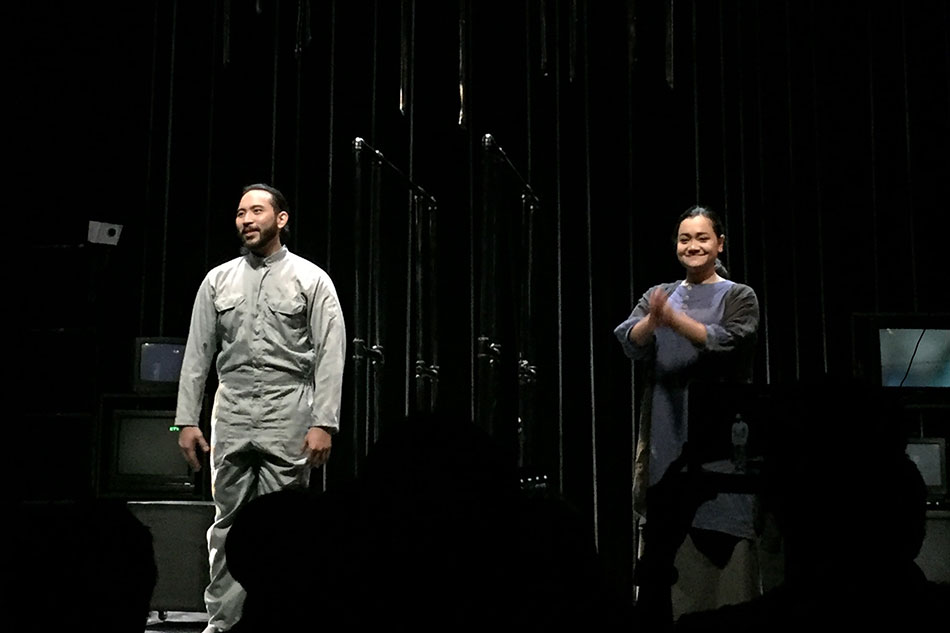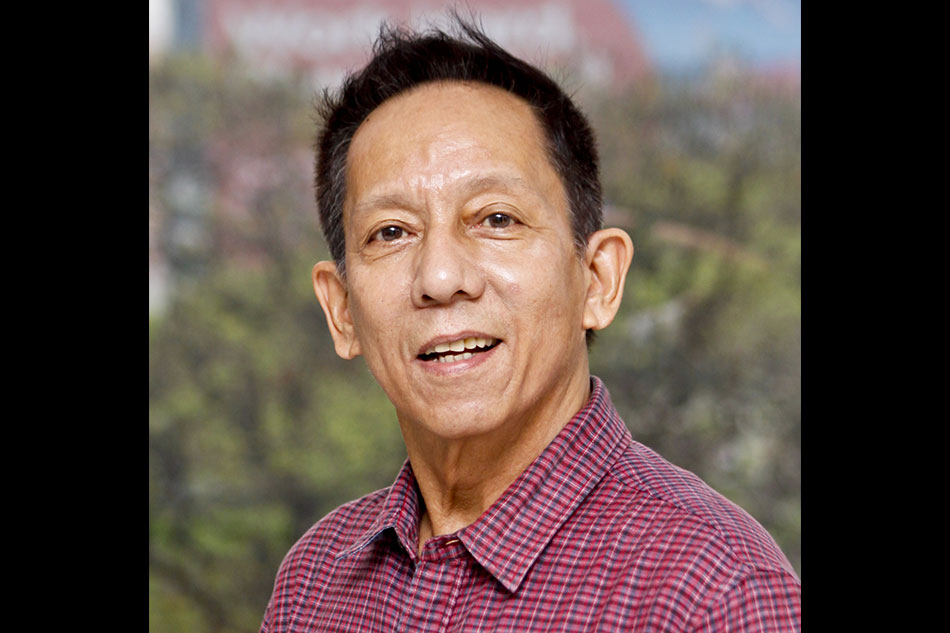Japanese play 'If He Doesn't See Your Face' explores loneliness, isolation
ADVERTISEMENT
Japanese play 'If He Doesn't See Your Face' explores loneliness, isolation
Totel V. de Jesus
Published Aug 04, 2019 02:26 PM PHT
MANILA -- There was this viral meme a few days before the recent national elections about a lawmaker who was jailed for plunder for allegedly stealing millions of pesos. He was wearing Superman's skin-tight signature uniform and the caption read, "The Man of Steal."
We are reminded of this poweful yet funny image while watching Suzue Toshiro's play, "If He Doesn't See Your Face," which is having its final performance today, Sunday, August 4, at 3p.m. at the Doreen Fernandez Black Box Theater at the Arete in Ateneo de Manila University.
It is directed by Dr. Ricardo Abad, sociologist, founding director of the Fine Arts program of the Loyola Schools and now artistic director of Arete.
The play is about a young couple working in a supermarket. Tatsuya (played by Brian Sy) is in jail, caught for stealing for the fourth time. His wife, Yasuyo (played by Delphine Buencamino) visits him and asks him why he keeps on stealing. This, despite them having a five-year-old son, Atsushi.
ADVERTISEMENT
The setting is in a prison compound's visiting section, where the conversation between inmate and visitor is closely monitored with a microphone.
The conversation appears in the middle of the play but having read the text, the spelling turns out to be "steel."
YASUYO: Superman appeared in the supermarket, but he got caught for steeling!
TATSUYA: What?
YASUYO: Get it? Cause he’s the ‘Man of Steel’? They arrested him for ‘steeling’? (Then, in a low, expressionless voice) …..Ha ha ha.
TATSUYA: That’s funny?
YASUYO: It is funny.
As the play progresses, we are made to see that Tatsuya appears to be an incurable thief but Yasuyo continues to love him for what he is. The question is, how long is she going to endure.
"If He Doesn't See Your Face" is third play by Toshiro that was staged in the Philippines. The first was "Like Fireflies" by the Tanghalang Ateneo in 2012, in which Toshiro was in attendance in several performances. In 2016, the second play, "My Friend Has Come" was staged by Ikarus Productions at Dito: Bahay ng Sining in Marikina, both co-owned and being ran by award-winning playwright-director Jay "BJ" Crisostomo IV. It was also re-staged by Tanghalang Ateneo same year and brought to the Asia-Pacific Bond of Theater Schoos Festival in New Delhi.
ADVERTISEMENT
Toshiro's plays explore isolation, loneliness, the need to connect in modern-day Japan. He is also considered one of the most translated, acclaimed Japanese playwrights of today.
A few days ago, we were asked by Abad if this kind of theater would contribute to the diversity of contemporary Philippine Theater. Our answer is a resounding yes.
We recently threw some questions to Abad and he was game enough to answer them all.
A: Tough to answer, but here's an indication from what a Japanese theater artist told me. Among them, he said, there's a great push to be different, unique, individual. It doesn't matter how weird one gets, but it has to be different, it has to reflect the unique voice of the artist or company of artists.
Suzue Toshiro took playwriting in college, but after graduation, he told me he could not write plays the way his teachers taught him. Sure he liked Samuel Beckett and the absurdists, but he can't copy them. So he vowed to find his own style. He got a group to test his ideas, and voila, he formed his own theater company.
ADVERTISEMENT
Other Japanese artists do that so in Japan you have small theaters and many small theater companies doing their thing. Add this to their immersion in Japanese culture, history, traditions, and you get a synthesis of something very strange and familar. I don't think playwrights here have the same pressure.
A: It's the text, his writing. This mixture of reality and super reality. (Haruki) Murakami does that, too. There is also this conversational tone that will strike people as too ordinary and boring. If they do look and listen for what is unsaid. Japanese are very indirect people and they always apologize. And sometimes they do something crazy out of nowhere, like corporate people who are so well behaved during the day and drunk crazy at night. And this shows up in the text, too. In that way, the text is very Japanese.
A: I met Suzue in a meeting of the Asia-Pacific Bond of Theater Schools. He was representative of Japan (Toho University), and I from the Philippines (Ateneo). I sat next to him during one coffee break, and knowing he was a playwright, I asked if I can read some of his plays in English translation. He dug into his bag, picked up a book. It was an anthology of Japanese plays in the 1990s, and he gave me the copy. He said that one of his plays, "Fireflies," was there. I read the book that night and next day I said I loved the play and would like to direct it some day. He said okay. In 2012, I wrote him to say I would direct it that year for Tanghalang Ateneo. I asked him about royalties, and he said he didn't need royalties. But he'd like a copy of the poster, the playbill, and maybe a video of the show.
He also said he'd like to watch the play in the Philippines. So I applied for a Japan Foundation grant to fly him over. The Foundation approved the proposal, and he came to watch "Fireflies." He was surprised the audience found some portions funny as the play evoked no laughter in Japan. But he was pleased with the production, found it refreshing.
Before he left, he dug into his bag one more and gave me two more of his plays in English translation. One was "My Friend Has Come" and the other was "If He Doesn't See Your Face." I did "My Friend Has Come" first because it was easier to cast. "If He Doesn't See Your Face" required more casting demands, and for a long time, I couldn't find a suitable pair.
ADVERTISEMENT
A: We are free to translate it. I am very curious to find out how it will come out.
A: Not sure how it will go. Maybe yes, one weekend after another. Or maybe combinations, one for the matinee, and the other evening. And then vice-versa. Not sure. Maybe you can help me figure it out. Hope Japan Foundation sponsors it again. If the Foundation sees the play is making some impact or influence in theater scene, they might be persuaded to co-present the trilogy.
A: I chose them because they are intelligent and sensitive actors. And I've known them since they were students so we know each other. Brian and Delphine have also worked together. So aside from their amazing talents, we all have some built in rapport going into the production. The designers are close friends in the theater, too, and that helps.
Beyond this, Delphine and Brian are terrific collaborators. They are not simply actors; they are also familiar with design and dramaturgy so they bring other things to the discussion table. And Delphine just finished her MFA in Collaborative Theater and brought to the same table a lot of devising exercises that we needed to do to explore the text. In short, theirs are informed performances -- and not simply intelligent or sensitive.
A: I think if the play can help if young people can get engaged with the text. It is also important, however, that they get a chance to talk about the text with others as a way to clarify what went on in the play. One of the things to learn is how to keep on connecting despite difficulties around you. It's also important to see how patience, listening, and love -- a focus on the other and not on yourself helps. But these may not appear right away. So conversation is important after the play.
ADVERTISEMENT
To that end, I am experimenting with a lugawan this Sunday. After the play, I'll invite people down to have arroz caldo to talk about the play. Maybe that will help.
A: I plan to submit this as an entry in an international festival next year (2020). I have three informal invitations but I have to choose because I don't think I'll find travel funds for three separate events. Magastos. But surely I'll make it to one. And then there's also 2021 with the International Theater Institute Festival where the Philippines is a member.
ADVERTISEMENT
ADVERTISEMENT




